"(Translation) 無衣子詩集 "茶泉""의 두 판 사이의 차이
| 1번째 줄: | 1번째 줄: | ||
{{Primary Source Document3 | {{Primary Source Document3 | ||
|Image = [[파일:한국불교전서.jpg|섬네일|.]] | |Image = [[파일:한국불교전서.jpg|섬네일|.]] | ||
| − | |English = | + | |English = Collection of Poetry by Muŭija |
|Chinese = 無衣子詩集 | |Chinese = 無衣子詩集 | ||
|Korean = [무의자시집] | |Korean = [무의자시집] | ||
2017년 7월 21일 (금) 08:39 판
| Primary Source | ||
|---|---|---|
| [[파일:|700px]] | Title | |
| English | Collection of Poetry by Muŭija | |
| Chinese | 無衣子詩集 | |
| Korean(RR) | [무의자시집] | |
| Text Details | ||
| Genre | Old Documents (文書) | |
| Type | 시(詩) | |
| Author(s) | 혜심(慧諶) | |
| Year | 13c | |
| Source | ||
| Key Concepts | Sŏn Buddhism(禪佛敎) | |
| Translation Info | ||
| Translator(s) | Youngsuk Park | |
| Editor(s) | Youngsuk Park | |
| Year | 2017 | |
Introduction
National Master of True Enlightenment (眞覺國師) Hyesim (慧諶, 1178-1234), whose pen name is Muŭija (無衣子 [the unclothed]), was a Buddhist Sŏn monk during the Koryŏ dynasty (918-1392). He is known as the propagator of Sŏn (Ch'an in Chinese, Zen in Japanese) and the key word (話頭) emptiness (無) in Korea. Previously a Confucian scholar, he became Chinul's (知訥 1158-1210) [1] disciple and successor. His Sŏn philosophy is characterized by the syncretic approach of Buddhism, Taoism and Confucianism. The Muŭija sijip (無衣子詩集, Collection of Poetry by Muŭija) is renowned for its pioneering work of syncretism between literature and Sŏn philosophy.
[1] The philosophical founder of Korean Sŏn Buddhism.
Original Script
| Classical Chinese | English |
|---|---|
|
Spring Water for Tea The moss-grown pine roots are barely traced The eye on the rock spurts auspicious water It is still not easy to grasp cool comfort Voluntarily I take Master Zhàozhōu's Sŏn. Clean Water It is colder than unmelted ice Brighter than a glossily clean mirror One taste of emptiness, the constance That reflects myriad forms and colors |
- Discussion Questions:
1. What are the elements of Taoism and Confucianism in the poems?
2. What is the relationship between awakening and drinking tea?
3. How does Hyesim realize the realm of Sŏn by means of the clean water?
Further Readings
- 韓國佛敎全書. 1999-2004. Han'guk Pulgyo chŏnsŏ 韓國佛敎全書 6 (Comprehensive Collection of Korean Buddhism). 14 vols. Seoul: Dongguk University Press.
- Hyesim. 1993. Chin'gak kuksa ŏrok 眞覺國師語錄 (Recorded Sayings of National Master of True Enlightenment), edited by Kim Taljin. Seoul: Segyesa.
- Hyesim. 2008. Muŭija sijip 無衣子詩集 (Collection of Poetry by Muŭija Hyesim), translated by Pae Kyubŏm. Seoul: Chimanji.
- Kagun. 2009. Sŏnmun yŏmsong sŏrhwa 禪門拈頌說話 (Narrative Tales of Enlightened Verses and Songs of the Meditation School), translated by Kim Wŏrun. Seoul: Dongguk yŏkkyŏngwŏn.
- Buswell, Robert E. 1992. Tracing back the radiance: Chinul's Korean way of Zen.
University of Hawaii Press.
- Keel, Hee-Sung. 1984. Chinul: The Founder of the Korean Sŏn Tradition. Berkeley Buddhist Studies Series 6. Berkeley: UC Berkeley.
- Chin, Sŏnggyu. 1986. "Hyesim ŭi saeng'ae wa sasang" (Hyesim's Life and Ideology). In Koryŏsa ŭi che munje (Issues of the History of Koryŏ), edited by Pyŏn T'aesŏp. Seoul: Samyŏngsa.
